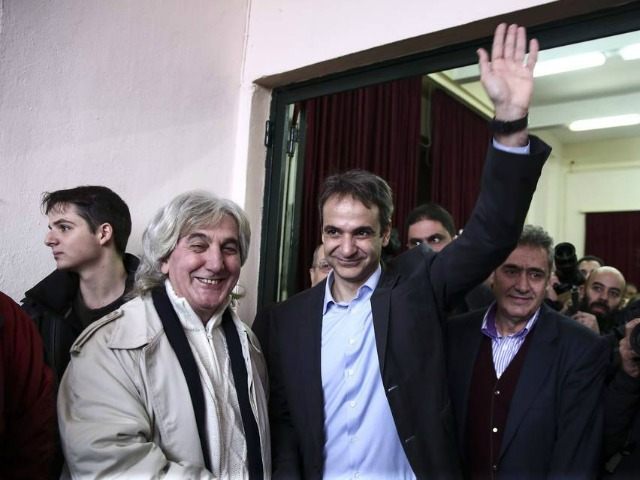“I do believe very strongly in the power of the private economy and private enterprise to create wealth.” – Kyriakos Mitsotakis
My cousin, Kyriakos, was just elected leader of the conservative New Democracy party.
The Wall Street Journal reports:
Mr. Mitsotakis, the 47-year-old, American-educated scion of one of Greece’s most prominent political dynasties, is an advocate of market-oriented economic overhauls, including slimming down Greece’s often-inefficient state. His surprise victory in Sunday’s party leadership ballot provides a boost to the cause of economic reforms of the kind demanded by Greece’s creditors, whose bailout loans have been keeping Greece from bankruptcy since 2010.
….
Mr. Mitsotakis faced the opposition of much of his party’s establishment, but gained support from primary voters who believe party should stand more clearly for economic overhauls.
Agence France-Presse (AFP) calls Kyriakos a “no-nonsense reformer” and quotes him:
“I stand for meritocracy, transparency and equal opportunities,” Mitsotakis told Kathimerini daily in an interview a day before the vote.
“I guarantee that we will soon create a great centre-right movement that will give Greece a reliable alternative solution in government.”
His background, as reported in Politico:
Born in 1968, Mitsotakis spent the first six years of his life in Paris; his parents had been forced into exile by Greece’s ruling colonels. The family returned in 1974 after the collapse of military rule, and Mitsotakis graduated from Athens College, an elite prep school. He attended college at Harvard and worked as a banker in London for much of the period that his father, Constantine, was prime minister (1990-93). After obtaining a degree from Harvard Business School, he worked as a management consultant and banker in London and Athens before his election to the Greek parliament in 2004.
In 1981, the socialist government of Andreas Papandreou came to power and took the country in a radical left direction. Under his leadership, the government grew to control a very large portion (two-thirds) of the economy, employ one of every five workers, and quadruple the national debt. Large-scale government monopolies were everywhere, run by massive public-sector unions. And on top of all that, it became law that civil servants, the number of which was skyrocketing, thanks to a grand patronage system, could not be dismissed unless they were caught in a criminal offense.
It has been downhill ever since.
There was one serious effort to reverse this trend, led by another family member of mine–Constantine Mitsotakis, Kyriakos’ father. As reported in James Angelos’s book The Full Catastrophe: Travels Among the New Greek Ruins, Constantine “governed Greece for three and a half years as prime minister at the start of the 1990s. [He] didn’t keep that position for long in large part because he tried to carry out some of the unpopular reforms the Troika later demanded of Greece: to cut government spending and privatize bloated state-owned companies.”
In 1990, 15-year-old Alexis Tsipras, now Greek Prime Minister and leader of the Coalition of the Radical Left (Syriza) Party, was recruited into the youth branch of the pro-Soviet Communist Party of Greece. That year, he became one of the leaders of the riots against the education reforms of then-Prime Minister Constantine Mitsotakis. The January 12, 1991, edition of The New York Times reported:
The Greek Government said today that four people had been killed in a fire and more than 100 hurt overnight as high school students and leftists clashed with riot policemen during protests over educational changes. … The riots began during a giant demonstration on Thursday night by high school students and leftists, who were protesting the death of a mathematics teacher a day earlier. He had been killed in clashes between rival student groups over whether the takeover of school premises should continue as a means of forcing through educational reform and the withdrawal of a widely debated Government education bill. … Government and police announcements said the four people killed had been trapped in a department store that was destroyed by fire. The fire resulted from a combination of firebombs tossed by students and tear gas used by the riot police to disperse them, the authorities said.
The chaos and internal party betrayal brought the government down. Each of the subsequent governments has refused to institute free-market reforms–making the crash inevitable and recovery impossible.
In 2013, James Angelos writes in The Full Catastrophe, Kyriakos was “given the unenviable job of reforming the public administration and implementing another unpopular measure: firing thousands of public workers, something no Greek politician had done in a very long time.”
He railed against the “overgrown client state that is the source of evil,” and carried out his duties until the coalition government he served was defeated by Syriza.
The Syriza folks know nothing about economics. Businessweek reported that Syriza’s chief economic adviser, Euclid Tsakalotos, believed that “the cure to Greece’s depression is what Germany received after World War II, when its economy was in a shambles: a Marshall Plan to put it back on its feet, forgiveness for some of its debt, and a payment scheme that takes into account the state of the economy.”
As usual with Marxists, he is way off the mark. It was not the Marshall Plan that fixed Germany. As Steve Forbes wrote, Germany’s “post-World War II economic savior” was Ludwig Erhard:
Against the wishes of the Allied occupiers, Erhard in the late 1940s threw off all of West Germany’s economic and rationing controls. He brought in a new currency, the deutsche mark, and launched the process of dramatically reducing Germany’s crushing wartime tax rates. Sound money, lightening the tax burden, removing government barriers to doing business–these were the ingredients for Germany’s postwar economic miracle.
It is capitalism–and capitalism alone–that has proven to be the cure for ailing economies. I hope that Greece will give my cousin a chance to prove it.

COMMENTS
Please let us know if you're having issues with commenting.